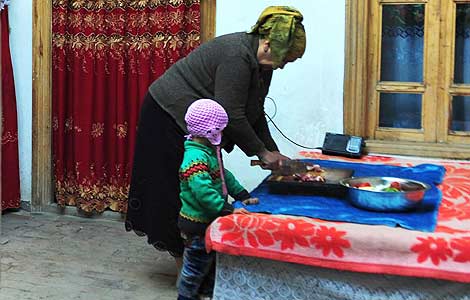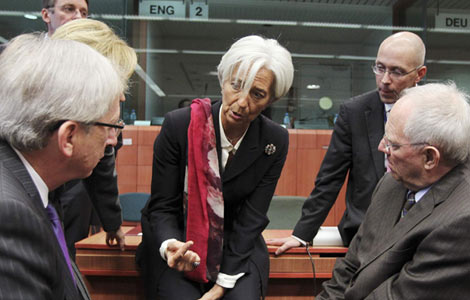Gender equality improved in China
Updated: 2011-10-21 22:42
(Xinhua)
|
|||||||||||
BEIJING - China has witnessed progress in gender equality during the past decade regarding improved education, increased employment opportunities, better respect within the family and more political participation for its women, according to a government survey report on Friday.
The survey was conducted by the All-China Women's Federation (ACWF) and the National Bureau of Statistics (NBS) last December. It is the third national survey following ones in 1990 and 2000.
"According to the latest survey, improvements in Chinese women's social status has occurred in all aspects including health and economic conditions, education and social management," said ACWF vice chairwoman Song Xiuyan.
In terms of education, the survey shows that women aged 18 to 64 are educated for 8.8 years on average, an increase of 2.7 years compared with that of 2000.
Among the surveyed, 33.7 percent of women have received high school education and above, while 14.3 percent have received college education and above, 10.4 percentage points higher than that of a decade ago.
The historically large gender gap in terms of years of education, was further narrowed to 0.3 of a year from 1.5 years in 2000, said the report.
The survey also shows 71.1 percent of women aged 18 to 64 are employed, mostly in the country's primary and tertiary industry.
Currently, 24.9 percent of rural female laborers are engaged in the non-agricultural industry, an increase of 14.7 percentage points from that of 2000.
Among the beneficiaries of loans, the proportion of women receiving government small loans for self-employed business is 37.3 percent, exceeding their male counterparts by 0.4 percentage points.
However, although the income of women has kept growing fast, the report said women's average annual income is still respectively equal to 67.3 percent of that of men in urban areas and 56 percent in rural areas.
As regards to their family status, the survey shows that 85.2 percent of women are moderately or very satisfied.
More than 72 percent of wives play a role in decision-making in household production and management and 74.7 percent in investment or loans concerning the family.
More women have participated in politics, with 83.6 percent of rural women having voted to elect a village head in the past five years, a jump of more than 10 percentage points since the last survey.
A total of 18.3 percent of women took initiatives to raise suggestions in their companies, communities and villages, higher than the 15.1 percent a decade ago.
The survey data also indicates 92.9 percent of women are concerned about "major domestic and foreign affairs, with 54.1 percent of women being involved in democratic supervision."
In September, a college student Li Yan sued three ministries after they failed to offer her the information of their deputy ministers' duties. She needed the information to finish her academic paper.
The court urged the departments to disclose the information and helped them come to an agreement with her.
China now has eight women in its top leadership, including State Councilor and CPC Central Committee Political Bureau member Liu Yandong, said Song Xiuyan.
"Problems and challenges are still present despite the great achievements in the past 10 years, such as inadequate education for women in central and western regions, the expanding income gap between men and women and the obstacles for women to further participate in political affairs," said Song.
About 24.7 percent of Chinese women have experienced domestic violence and 10 percent of women have suffered from gender discrimination, according to the report.
"The ACWF is working very hard to lobby law-makers to adopt a special law on domestic violence," said Zhen Yan, also an ACWF vice chairwoman.
Gender equality is a basic state policy of China and has been written into the 2005 amended Law on Protection of Rights and Interests of Women, Song added.
Hot Topics
Libya conflict, Gaddafi, Oil spill, Palace Museum scandal, Inflation, Japan's new PM, Trapped miners, Mooncake tax, Weekly photos, Hurricane Irene
Editor's Picks

|

|

|

|

|

|







